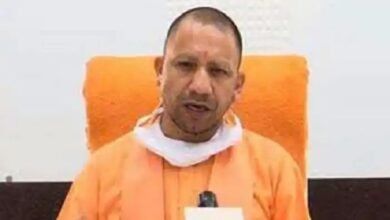[ad_1]

A five-judge bench headed by Chief Justice DY Chandrachud during pronouncement of verdict on a batch of petitions challenging the abrogation of Article 370, on December 11, 2023. (PTI)
Article 370 verdict: Writing the judgment for himself and Justices Gavai and Surya Kant, Chief Justice of India DY Chandrachud said Article 370 of the Constitution was a temporary provision and the president has the power to revoke it
The Supreme Court on Monday upheld the government’s decision to abrogate Article 370, which bestowed special status on the erstwhile state of Jammu and Kashmir, and said steps should be taken to conduct elections in the Union Territory by September 30 next year.
Writing the judgment for himself and Justices Gavai and Surya Kant, Chief Justice of India DY Chandrachud said Article 370 of the Constitution was a temporary provision and the president has the power to revoke it. The apex court also upheld the validity of the decision to carve out the union territory of Ladakh from Jammu and Kashmir in August 2019.
The erstwhile state of Jammu and Kashmir does not have internal sovereignty different from other states of the country, he said.
According to CJI DY Chandrachud, the five issues discussed were:
- Whether Article 370 temporary
- Whether substitution of ‘Constituent Assembly’ by Legislative Assembly by using Article 370(1)(d) is valid
- Whether presidential order invalid for lack of recommendation of J&K Constituent Assembly
- Whether the Presidential Rule imposed in 2018 and subsequent extensions are valid
- Whether the J&K Reorganisation Act bifurcating the state into two UTs is constitutionally valid
Here’s a look at the operative parts of the judgement read out by CJI Chandrachud:
- On the President’s proclamation: “The court need not adjudicate on this since the petitioners did not challenge it. In any case, it was withdrawn in October 2019 and hence no relief can be granted.”
- The Supreme Court held that there are restrictions on powers to be exercised post imposition of Presidential’s Rule, but “every decision of the Centre taken for the State post imposition of Presidential’s Rule can’t lead to a legal challenge. The same can cause chaos.”
- “The State of Jammu and Kashmir didn’t attain independent sovereignty when it merged in India… J&K has no internal sovereignty which is distinguishable from other states. J&K surrendered its sovereignty while merging with India. The J&K constitution was only to further its relation with India.”
- “Article 370 is a temporary provision. J&K’s constitution was subordinate to the Constitution of India. Artical 370 was introduced to serve transitional purpose to serve as an interim process.”
- “Recommendation of Constituent Assembly was not binding on President. Constituent Assembly was a temporary body. This means president can abrogate Article 370.”
- “We don’t find that President’s exercise to abrogate Article 370 was malafide. We cannot sit in appeal over the decision of the President of India. The President seeking concurrence of the central government before the abrogation isn’t arbitrary.”
- On the J&K Reorganisation Act: “Since Solicitor General Tushar Mehta has said that statehood would be restored, we are not going into the validity of the Act.”
- “We direct that steps shall be taken so that elections are held in Legislative Assembly of J&K by September 2024 and statehood shall be restored as soon as possible.”
- “Exercise of power by President should have reasonable nexus. President’s power after a proclamation are subject to judicial review. Parliament’s power to exercise powers of state government under 356(1) isn’t restricted to law making power.”
- “J&K’s Constitution has become redundant.”
The petitions challenging the abrogation of the provisions of Article 370 and the validity of the Jammu and Kashmir Reorganisation Act, 2019 that divided the erstwhile state into the Union territories of Jammu and Kashmir and Ladakh were referred to the Constitution bench in 2019. The arguments in the matter had commenced on August 2.
The apex court had reserved its verdict in the matter on September 5 after a 16-day hearing.
During the hearing, the top court heard Attorney General R Venkataramani, Solicitor General Tushar Mehta, senior advocates Harish Salve, Rakesh Dwivedi, V Giri and others on behalf of the Centre and the intervenors defending the abrogation of the provisions of Article 370.
Senior advocates, including Kapil Sibal, Gopal Subramanium, Rajeev Dhavan, Zaffar Shah and Dushyant Dave, had argued on behalf of the petitioners.
The lawyers had dwelt on various issues, including the constitutional validity of the Centre’s decision to abrogate the provisions of Article 370, the validity of the Jammu and Kashmir Reorganisation Act, which split the erstwhile state into two Union territories, challenges to the imposition of the governor’s rule in Jammu and Kashmir on June 20, 2018 and the imposition of the president’s rule on December 19, 2018 and its extension on July 3, 2019.
During the hearing, the apex court had asked who can recommend the revocation of Article 370 in Jammu and Kashmir when no constituent Assembly, the concurrence of which is required before taking such a step, exists there.
The top court had also asked how can a provision (Article 370), which was specifically mentioned as temporary in the Constitution, become permanent after the tenure of the Jammu and Kashmir constituent Assembly came to an end in 1957.
Some of the petitioners opposing the repeal of Article 370 had argued that the provision could not have been abrogated as the term of the Jammu and Kashmir constituent Assembly ended in 1957 after it drafted the erstwhile state’s Constitution.
With the constituent Assembly having become extinct, Article 370 acquired a permanent status, they had said.
The Centre had argued that there was no “constitutional fraud” in annulling the provision that accorded the special status to the erstwhile state of Jammu and Kashmir.




